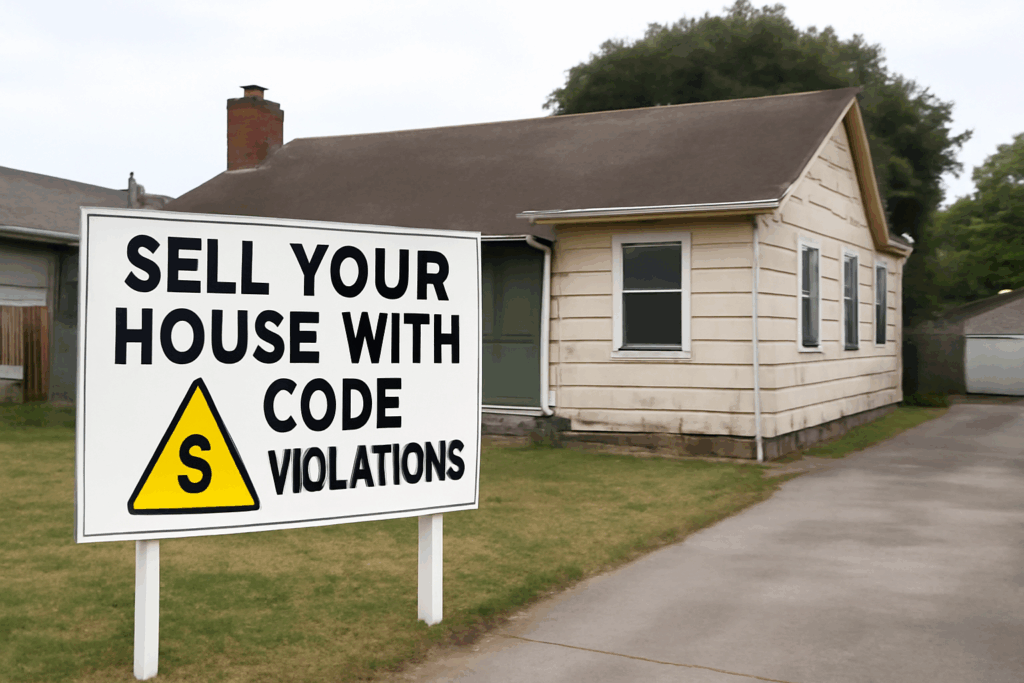If you’re a homeowner in Davie, FL, and you’ve recently discovered that your property has code violations, it’s understandable to feel overwhelmed. The prospect of selling a home that doesn’t meet local building codes can be intimidating, especially if you’re unsure of your options or the costs involved. You might be asking yourself, “Can I even sell my house with code violations?” or “How much will this cost me to fix all the issues before I can sell?” In addition to those questions, you’re probably worried about the time and effort involved in trying to make repairs or resolve violations, and whether you’ll even be able to recoup those costs.
You may also be thinking about the future—how long will it take to sell? What if no one is interested in buying? Will the property be worth anything if I don’t fix the violations first? These are all valid concerns, and it’s important to address them head-on. You’re likely looking for a quick, efficient, and hassle-free solution—something that won’t require you to spend significant amounts of money on repairs, inspections, and appraisals. And that’s where selling your house for cash comes into play. In this blog, we’ll explore the benefits of selling your home as-is to a cash buyer and show you why this might be your best option when dealing with code violations. This approach allows you to avoid all the stress, uncertainty, and expense of traditional home selling.
Can I Sell My House with Code Violations in Davie, FL?

Selling a home with code violations in Davie, FL, can be a challenging experience, but it doesn’t mean your home is unsellable. While it’s true that code violations can complicate the traditional selling process, they don’t necessarily eliminate your ability to sell your property. The key is to work with the right kind of buyer—specifically, a cash home buyer who specializes in purchasing properties as-is, no matter the condition.
What Are Code Violations and How Do They Impact the Sale?
Before diving into the sale process, it’s important to clarify what code violations are and how they might affect your ability to sell a home. Code violations occur when your property doesn’t meet the building or zoning codes set by your local government or municipal authority. These codes are put in place to ensure that homes are safe and habitable. Some common examples of code violations include:
- Unpermitted Additions or Renovations: If you’ve made changes to the home, such as adding a room or bathroom without obtaining the proper permits, it could be considered a code violation. You can check with the Davie Building Department for more details.
- Structural Issues: Cracks in the foundation, roof leaks, or sagging floors are all examples of structural problems that can violate building codes.
- Plumbing or Electrical Problems: Outdated plumbing systems, faulty electrical wiring, or unpermitted electrical work can violate health and safety codes.
- Non-Compliance with Zoning Laws: Your property might be in violation of local zoning laws if, for example, it has been used for an unintended purpose, such as converting a garage into living space.
- Overgrown Vegetation or Landscaping Issues: Some municipalities have strict rules about the maintenance of the exterior of a property, and failure to comply can result in fines and violations. Find information on local code enforcement and property maintenance from Broward County Code Enforcement – Violations.
How Do Code Violations Affect the Sale Process?
In most traditional sales, buyers and their agents expect homes to meet basic safety standards and building codes. Code violations can make a property less appealing to potential buyers, and in many cases, buyers will request that the issues be fixed before they move forward. If the seller cannot make the necessary repairs, it can lead to the sale falling through or result in price negotiations that may leave the seller with less money than anticipated.
Moreover, sellers may need to provide certificates of compliance or pay for costly repairs to bring the property up to code before they can sell. This can mean thousands of dollars in additional expenses, which many homeowners with code violations simply cannot afford or do not have the time to address. In some cases, the violation could even lead to fines or legal actions that further complicate the sale process.
But there’s good news: You don’t have to make expensive repairs or worry about lengthy negotiations when you choose to sell to a cash home buyer.
The Cash Buyer Advantage: Sell “As-Is” Without Repairs
Selling your home to a cash buyer offers significant advantages, especially if your property has code violations. The most important benefit is that cash buyers purchase homes as-is, which means you can avoid costly repairs and avoid the stress of trying to make your home comply with building codes.
The Process of Selling to a Cash Buyer
Selling to a cash buyer is much simpler and faster than going through a traditional sale with a realtor. The process typically involves the following steps:
- Contact a Cash Buyer: The first step is reaching out to a cash buyer who specializes in buying homes with code violations. You’ll provide some basic information about the condition of your home, and the buyer will conduct a quick evaluation of your property.
- Receive an Offer: Based on your home’s condition—code violations included—the cash buyer will present you with a fair cash offer. Unlike traditional buyers, cash buyers typically skip appraisals and inspections. They are accustomed to buying homes in as-is condition, including those with violations.
- Accept the Offer: Once you’ve reviewed and agreed to the cash offer, you can sign the sales agreement. There’s no need to worry about buyer contingencies, such as the need to fix repairs or pass inspections.
- Close Quickly: Cash sales typically close much faster than traditional sales. In fact, you can close in as little as 7 to 14 days, depending on your needs and the buyer’s timeline.
- Get Paid: On closing day, the cash buyer will handle all the paperwork, and you’ll receive your payment in full, without any commission or hidden fees.
For more insights on the advantages of selling for cash, check out this article on Why Cash Offers Are Beneficial for Home Sellers—it explains how cash offers help homeowners avoid common problems and complications.
Benefits of Selling to a Cash Buyer
Here’s why selling to a cash buyer is particularly advantageous for homes with code violations:
- No Repairs Required: Cash buyers will purchase your property in its current condition, including any code violations. This means you don’t have to spend time or money making repairs or bringing your home up to code.
- No Commissions or Fees: Traditional real estate agents charge a commission of around 6% of the sale price, which can amount to thousands of dollars. With a cash sale, you keep more of the sale price, as there are no agent commissions, fees, or hidden costs.
- Fast Closing: Cash buyers can close on your home in as little as 7-14 days, which is perfect if you need to sell quickly due to financial strain, foreclosure, or other personal reasons.
- No Buyer Contingencies: Traditional buyers often include contingencies that can delay the sale or cause it to fall through. For example, a buyer may ask you to fix code violations before the sale, or they may back out of the deal after an inspection reveals problems. Cash buyers remove these uncertainties, providing a smooth, reliable sale.
Pros and Cons of Selling to a Realtor vs. a Cash Buyer
Selling your home through a realtor may seem like the traditional option, but when it comes to code violations, it’s important to understand the pros and cons of each approach. Here’s a detailed comparison of selling to a realtor versus a cash buyer:
| Factor | Realtor Sale | Cash Buyer Sale |
|---|---|---|
| Time to Sell | 3-6 months or longer | 7-14 days |
| Repairs/Upgrades | Required to fix code violations and make repairs | No repairs needed |
| Costs/Fees | 6% commission + closing costs | No commissions, no fees |
| Certainty of Sale | Can fall through due to financing or buyer concerns | No contingencies; guaranteed sale |
| Paperwork | Requires appraisals, inspections, and more paperwork | Simple, quick paperwork |
| Potential Price | Market value, but negotiations can reduce the final price | May be lower than market value, but guaranteed sale and no repair costs |
As you can see, selling to a cash buyer offers a quicker, easier, and more predictable process, especially if your property has code violations. The certainty and speed make it an excellent choice for homeowners who want to move on quickly without dealing with the added costs and delays of repairs and realtor commissions.
6 Key FAQs When Selling a House for Cash with Code Violations
Q. Can I sell my house with code violations in Davie, FL?
Yes! You can sell your house fast to a cash buyer even if it has code violations. Companies like Property Solution Services buy homes as-is, so no repairs are needed.
Q. Will a house with code violations fetch a good cash offer?
Cash buyers consider the overall property value and repair costs. Even with code violations, you can receive a fair cash offer based on your home’s potential.
Q. Do I need to fix my code violations before selling?
No. Cash buyers purchase properties as-is. You won’t need to pay for repairs, inspections, or permit issues.
Q. How fast can I sell my property with code violations in Davie, FL?
Most cash buyers can close in 7–30 days, depending on your situation and the property’s condition.
Q. Are cash home buyers in Davie, FL trustworthy?
Yes, but it’s important to verify the buyer’s credibility. Look for companies with local experience, transparent offers, and verified reviews.
Q. Can I sell a vacant or inherited property with code violations?
Absolutely. Cash buyers specialize in purchasing all types of properties, including vacant, inherited, or distressed homes, regardless of code violations.
Conclusion: How Property Solution Services LLC Helps You Sell Your House with Code Violations in Davie, FL, Stress-Free
Selling a house with code violations in Davie, FL, doesn’t have to be a complicated or stressful process. With Property Solution Services LLC, you can avoid costly repairs, lengthy negotiations, and high commissions. By selling your home as-is for cash, you eliminate the need for dealing with inspections, appraisals, and repairs, making the process faster and simpler.
If you’re ready to move forward and get a fair, no-obligation cash offer for your property, contact Property Solution Services LLC today. We specialize in helping homeowners just like you sell quickly and efficiently, no matter the condition of the house. Let us help you put the burden of code violations behind you and move forward with confidence. Reach out to Property Solution Services LLC now and take the first step toward a stress-free sale!

